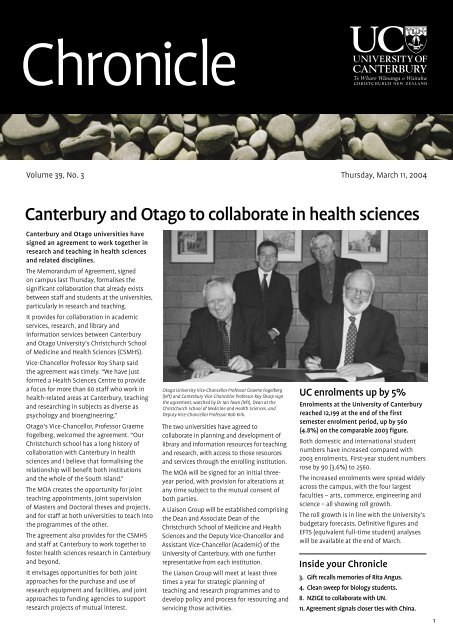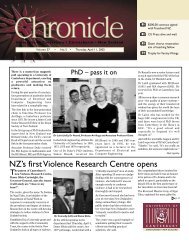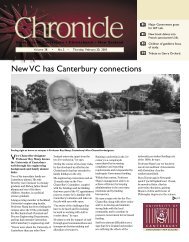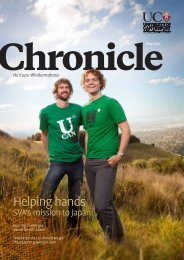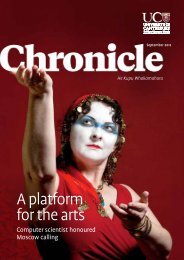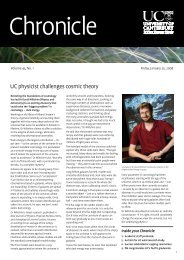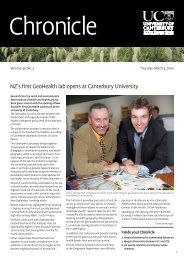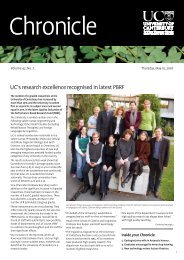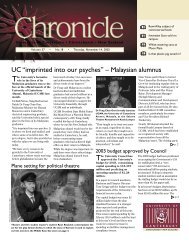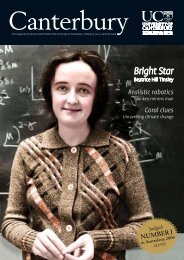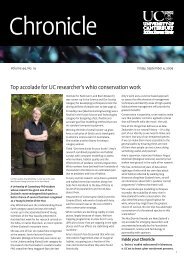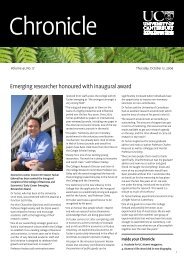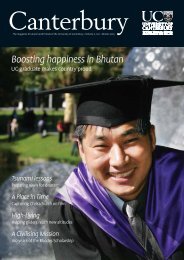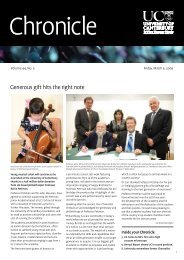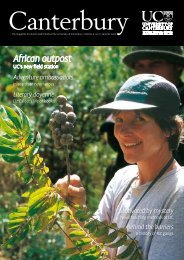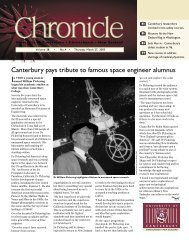No 3 - 11 March 2004 - Communications and Development ...
No 3 - 11 March 2004 - Communications and Development ...
No 3 - 11 March 2004 - Communications and Development ...
Create successful ePaper yourself
Turn your PDF publications into a flip-book with our unique Google optimized e-Paper software.
Chronicle<br />
Volume 39, <strong>No</strong>. 3 Thursday, <strong>March</strong> <strong>11</strong>, <strong>2004</strong><br />
Canterbury <strong>and</strong> Otago to collaborate in health sciences<br />
Canterbury <strong>and</strong> Otago universities have<br />
signed an agreement to work together in<br />
research <strong>and</strong> teaching in health sciences<br />
<strong>and</strong> related disciplines.<br />
The Memor<strong>and</strong>um of Agreement, signed<br />
on campus last Thursday, formalises the<br />
significant collaboration that already exists<br />
between staff <strong>and</strong> students at the universities,<br />
particularly in research <strong>and</strong> teaching.<br />
It provides for collaboration in academic<br />
services, research, <strong>and</strong> library <strong>and</strong><br />
information services between Canterbury<br />
<strong>and</strong> Otago University’s Christchurch School<br />
of Medicine <strong>and</strong> Health Sciences (CSMHS).<br />
Vice-Chancellor Professor Roy Sharp said<br />
the agreement was timely. “We have just<br />
formed a Health Sciences Centre to provide<br />
a focus for more than 60 staff who work in<br />
health-related areas at Canterbury, teaching<br />
<strong>and</strong> researching in subjects as diverse as<br />
psychology <strong>and</strong> bioengineering.”<br />
Otago’s Vice-Chancellor, Professor Graeme<br />
Fogelberg, welcomed the agreement. “Our<br />
Christchurch school has a long history of<br />
collaboration with Canterbury in health<br />
sciences <strong>and</strong> I believe that formalising the<br />
relationship will benefit both institutions<br />
<strong>and</strong> the whole of the South Isl<strong>and</strong>.”<br />
The MOA creates the opportunity for joint<br />
teaching appointments, joint supervision<br />
of Masters <strong>and</strong> Doctoral theses <strong>and</strong> projects,<br />
<strong>and</strong> for staff at both universities to teach into<br />
the programmes of the other.<br />
The agreement also provides for the CSMHS<br />
<strong>and</strong> staff at Canterbury to work together to<br />
foster health sciences research in Canterbury<br />
<strong>and</strong> beyond.<br />
It envisages opportunities for both joint<br />
approaches for the purchase <strong>and</strong> use of<br />
research equipment <strong>and</strong> facilities, <strong>and</strong> joint<br />
approaches to funding agencies to support<br />
research projects of mutual interest.<br />
Otago University Vice-Chancellor Professor Graeme Fogelberg<br />
(left) <strong>and</strong> Canterbury Vice-Chancellor Professor Roy Sharp sign<br />
the agreement, watched by Dr Ian Town (left), Dean at the<br />
Christchurch School of Medicine <strong>and</strong> Health Sciences, <strong>and</strong><br />
Deputy Vice-Chancellor Professor Bob Kirk.<br />
The two universities have agreed to<br />
collaborate in planning <strong>and</strong> development of<br />
library <strong>and</strong> information resources for teaching<br />
<strong>and</strong> research, with access to those resources<br />
<strong>and</strong> services through the enrolling institution.<br />
The MOA will be signed for an initial threeyear<br />
period, with provision for alterations at<br />
any time subject to the mutual consent of<br />
both parties.<br />
A Liaison Group will be established comprising<br />
the Dean <strong>and</strong> Associate Dean of the<br />
Christchurch School of Medicine <strong>and</strong> Health<br />
Sciences <strong>and</strong> the Deputy Vice-Chancellor <strong>and</strong><br />
Assistant Vice-Chancellor (Academic) of the<br />
University of Canterbury, with one further<br />
representative from each institution.<br />
The Liaison Group will meet at least three<br />
times a year for strategic planning of<br />
teaching <strong>and</strong> research programmes <strong>and</strong> to<br />
develop policy <strong>and</strong> process for resourcing <strong>and</strong><br />
servicing those activities.<br />
UC enrolments up by 5%<br />
Enrolments at the University of Canterbury<br />
reached 12,199 at the end of the first<br />
semester enrolment period, up by 560<br />
(4.8%) on the comparable 2003 figure.<br />
Both domestic <strong>and</strong> international student<br />
numbers have increased compared with<br />
2003 enrolments. First-year student numbers<br />
rose by 90 (3.6%) to 2560.<br />
The increased enrolments were spread widely<br />
across the campus, with the four largest<br />
faculties – arts, commerce, engineering <strong>and</strong><br />
science – all showing roll growth.<br />
The roll growth is in line with the University’s<br />
budgetary forecasts. Definitive figures <strong>and</strong><br />
EFTS (equivalent full-time student) analyses<br />
will be available at the end of <strong>March</strong>.<br />
Inside your Chronicle<br />
3. Gift recalls memories of Rita Angus.<br />
4. Clean sweep for biology students.<br />
8. NZIGE to collaborate with UN.<br />
<strong>11</strong>. Agreement signals closer ties with China.<br />
1
2<br />
Customer Services Manager Irene Bird, the Chairman of the AV Committee David Fortin <strong>and</strong> AV Group Leader Gil Barker monitor the<br />
action in the new television studio.<br />
Garage finds new life as TV studio<br />
Two hundred dollars <strong>and</strong> a little kiwi<br />
ingenuity have turned an old garage into a<br />
D.I.Y television studio.<br />
The studio, in the old brick garage in Forestry<br />
Road, is the initiative of the University’s<br />
Audio Visual Group.<br />
Aptly named Garage Productions, the studio<br />
will provide live multi-camera interview<br />
training for students studying mass media<br />
<strong>and</strong> journalism. It will also provide a recording<br />
<strong>and</strong> interview facility capable of producing<br />
broadcast quality sound <strong>and</strong> pictures for<br />
teaching <strong>and</strong> for promoting the University.<br />
AV Group Leader Mr Gil Barker said the<br />
studio had been developed utilising retired<br />
Chronicle<br />
Next Issue: 25 <strong>March</strong>, <strong>2004</strong><br />
Deadline: 19 <strong>March</strong>, <strong>2004</strong><br />
Editor: Jeanette Colman<br />
Ext 6260 or 364 2260<br />
Sub-editor: Col Pearson<br />
Photos: Duncan Shaw-Brown<br />
Artwork: Marcus Thomas<br />
Distribution: Kate Frew<br />
Design <strong>and</strong> Print Services<br />
E-mail: comms@canterbury.ac.nz<br />
Fax: Ext 6679 or 364 2679<br />
Address: <strong>Communications</strong> <strong>and</strong><br />
<strong>Development</strong> Department,<br />
University of Canterbury,<br />
Private Bag 4800,<br />
Christchurch.<br />
The Chronicle is typeset <strong>and</strong><br />
printed by Design & Print Services.<br />
<strong>and</strong> surplus equipment, some of it<br />
dating back 20 years. “Most of it we found<br />
in the University warehouse. The old carpet<br />
is from the Music School. About the only<br />
thing new are the lights from<br />
The Warehouse.”<br />
The studio is set up with three live cameras<br />
<strong>and</strong> a self-contained production suite.<br />
The “Garage” can be booked through AV.<br />
New Zeal<strong>and</strong>’s first high temperature<br />
superconducting transformer (HTST) is<br />
now being assembled at the University<br />
of Canterbury.<br />
The device is the result of collaboration<br />
between the University <strong>and</strong> Meridian<br />
Energy Ltd. It uses ceramic-based<br />
superconducting material immersed in<br />
liquid nitrogen <strong>and</strong> is designed to replace<br />
traditional oil-filled machines, with weight<br />
<strong>and</strong> transport advantages.<br />
The superconductor follows on from the<br />
University’s development of a resonating<br />
high voltage transformer (RHV Transformer)<br />
for use in testing large power generators.<br />
The transformer needed to be portable<br />
enough to be moved around the country for<br />
testing at various power stations. It has been<br />
extensively used at Manapouri underground<br />
power station.<br />
“What is exciting about this technology<br />
is that it offers significant weight, <strong>and</strong><br />
therefore transportation, advantages<br />
over commercially available units,” said<br />
Professor Pat Bodger (Electric <strong>and</strong> computer<br />
Engineering), who heads the development<br />
team. The total crated weight of the<br />
University Council to<br />
meet in city<br />
The <strong>March</strong> meeting of the University Council<br />
will be held at the Christchurch City Council<br />
offices, in the spirit of the protocol signed<br />
late last year between the University <strong>and</strong><br />
the CCC.<br />
The aim of the protocol is to enable the two<br />
organisations to work together to enrich<br />
the cultural <strong>and</strong> intellectual life of the<br />
city, ensuring CCC access to the education,<br />
knowledge <strong>and</strong> research of the University,<br />
support for its students <strong>and</strong> research<br />
activities, <strong>and</strong> a framework for collaboration<br />
in promoting the University to funders,<br />
researchers, students <strong>and</strong> employers.<br />
Areas of cooperation focus on student<br />
education <strong>and</strong> workforce development,<br />
research cooperation <strong>and</strong> a jointly<br />
sponsored public lecture series. Both<br />
organisations have agreed to involve Ngäi<br />
Tahu wherever possible.<br />
Priorities for <strong>2004</strong> include a joint scholarship<br />
programme for research degrees, a citybased<br />
public lecture series, development of<br />
short courses <strong>and</strong> professional development<br />
initiatives relevant to the local government<br />
sector, establishing liaison contacts within<br />
the new Colleges, collaboration on research<br />
initiatives of benefit to both organisations,<br />
CCC input into membership of academic<br />
advisory groups, <strong>and</strong> reciprocal hosting of<br />
Council meetings.<br />
New transformer type under construction at Canterbury<br />
RHV Transformer is under half a tonne,<br />
compared with more than 6.5 tonnes for<br />
other commercial models.<br />
“Moreover, the construction does not<br />
require the use of liquid dielectric oil<br />
which significantly reduces air-freight<br />
issues <strong>and</strong> costs, as well as environmental<br />
<strong>and</strong> safety risks,” he added.<br />
A Christchurch company, CanterburyTX,<br />
has been formed to develop the<br />
technology further, while local companies,<br />
Viva <strong>and</strong> PB Power (NZ) Ltd, are supplying<br />
electrical <strong>and</strong> mechanical engineering<br />
expertise. The technology is jointly owned<br />
by Canterprise Ltd, the inventors (Professor<br />
Bodger, Wade Enright, Matthew O’Neill<br />
<strong>and</strong> Rick Liew), <strong>and</strong> Meridian Energy.<br />
The HTST will undergo its initial<br />
performance testing during <strong>March</strong> <strong>2004</strong>.<br />
“The global power transformer market is<br />
worth billions of dollars,” Professor Bodger<br />
said. “Following the completion of the<br />
first transformer, the objective is to begin<br />
constructing a superconducting power<br />
transformer that can be connected to the<br />
distribution network, in the second half<br />
of <strong>2004</strong>.”
Full review of enrolment system<br />
Vice-Chancellor Professor Roy Sharp has<br />
announced a full review into problems with<br />
this year’s enrolment process.<br />
Speaking at the February meeting of<br />
the University Council, Professor Sharp<br />
acknowledged that significant problems<br />
faced by some students were unsatisfactory<br />
<strong>and</strong> led to unfortunate levels of frustration<br />
for them <strong>and</strong> for staff.<br />
A lot had been learnt already about the cause<br />
of the problems <strong>and</strong> the review would build<br />
on that <strong>and</strong> establish what needed to be<br />
done, he said.<br />
The problems had not affected roll numbers,<br />
however, with enrolments on target to be up<br />
about 4%, in line with budget predictions.<br />
Professor Sharp said the three reasons for<br />
changing the system this year were: to align<br />
Mrs Crumpton recalls her time at Bishop Julius Hostel with a flip through her album of photographs of the period.<br />
Gift recalls memories of Rita Angus<br />
A 1927 Rita Angus sketch of Bishop Julius<br />
Hostel has been gifted to the University by<br />
Edna Crumpton.<br />
Mrs Crumpton, who was attending<br />
Christchurch Teachers College with a group<br />
of her West Coast friends at the time, was<br />
one of 30 young women staying in the<br />
hostel that year.<br />
The acclaimed New Zeal<strong>and</strong> artist Rita<br />
Angus, who later became a key member<br />
of the Christchurch Group, was also at BJH<br />
having travelled from Napier to study at the<br />
University’s School of Art.<br />
While the Teachers’ College students were on<br />
studentships, the art students were not, so<br />
Angus <strong>and</strong> her fellow artists sold small works<br />
to finance their studies.<br />
Mrs Crumpton bought one of the three BJH<br />
sketches she recalls Angus drawing <strong>and</strong><br />
believes she is the only purchaser to have<br />
procedures with the new College structure<br />
<strong>and</strong> relieve academic staff of some of the<br />
burden; to be able to inform students as<br />
early as possible that they were approved<br />
for their chosen course of study; <strong>and</strong> to<br />
move towards a fully web <strong>and</strong> phone-based<br />
enrolment process.<br />
Despite the problems about 5000 students<br />
were fully enrolled before the three-day<br />
on-campus enrolment period, a first for the<br />
University Professor Sharp said.<br />
Students’ Association President Pete Martin<br />
called for better communication to students<br />
about where they were in the process, <strong>and</strong><br />
acknowledged the hard work of front-line<br />
enrolment staff, especially on the first day of<br />
on-campus enrolment.<br />
kept such a work all her life.<br />
She recalls clearly Angus’s commitment to<br />
her work <strong>and</strong> her reluctance to be watched<br />
while working.<br />
“She was good at her drawing but she didn’t<br />
like us watching her for long so we took turns.”<br />
Mrs Crumpton’s career took her back to the<br />
West Coast, teaching in a number of small<br />
primary schools before finishing her teaching<br />
days at Greymouth High School.<br />
All three of her children studied at Canterbury:<br />
Ian completed a BA, went on to study theology<br />
<strong>and</strong> is now at the local Presbyterian church,<br />
St Ninians; Robert did a BE (Hons) degree in<br />
electrical engineering <strong>and</strong> is now retired; Joy,<br />
who did a BSc, is now deceased.<br />
The original sketch will become part of the<br />
Macmillan Brown Library collection, <strong>and</strong><br />
copies of the work are being made for Mrs<br />
Crumpton <strong>and</strong> Bishop Julius Hostel.<br />
Photo: Jeff Field, <strong>Communications</strong> <strong>and</strong> <strong>Development</strong><br />
Foundation’s efforts make<br />
historical instrument<br />
purchase possible<br />
The School of Music is to get a fortepiano<br />
thanks to the fundraising efforts of the<br />
University of Canterbury Foundation.<br />
In just three months the foundation raised<br />
the $60,000 required for the purchase<br />
of a fortepiano, a predecessor to the<br />
modern piano.<br />
UC Foundation Executive Officer Ms<br />
Shelagh Murray said she wanted to<br />
acknowledge the efforts of the UC<br />
Foundation trustees who personally<br />
assisted with the success of the project.<br />
Head of Music Dr Roger Buckton said he was<br />
absolutely delighted that students would<br />
be able to hear <strong>and</strong> play the instrument for<br />
which a great deal of basic piano repertoire<br />
was intended.<br />
“I would like to convey my thanks to the UC<br />
Foundation <strong>and</strong> donors who very graciously<br />
<strong>and</strong> enthusiastically supported this project,”<br />
Dr Buckton said.<br />
“Canterbury students will now have<br />
the opportunity to play <strong>and</strong> perform on<br />
an historical piano of the type which<br />
Beethoven would have used. As stated by<br />
one of our current piano applicants, Peter<br />
Nagy from the Lizst Academy, Budapest,<br />
it’s not until students have experienced the<br />
same type of instrument that the composer<br />
used can they have any true feeling for the<br />
possibilities behind the music.”<br />
Invented at the turn of the 18 th century,<br />
the fortepiano was the solution to the<br />
harpsichord’s inability to produce different<br />
dynamic levels. Although more limited<br />
than the modern piano, the fortepiano is<br />
capable of a reasonable dynamic range.<br />
The action is much lighter, the pedal has<br />
quite a different effect <strong>and</strong> the bass has a<br />
much clearer sound.<br />
Canterbury’s fortepiano is being<br />
h<strong>and</strong>crafted by Auckl<strong>and</strong>er Paul Downie<br />
<strong>and</strong> will be based on a German instrument<br />
of Conrad Graf built in 1824. It will be the<br />
first six-octave instrument in the country.<br />
The University expects to take delivery of its<br />
new instrument in early 2005.<br />
VC to take over as Deputy<br />
Chair of NZVCC<br />
Professor Roy Sharp will take up an<br />
appointment as Deputy Chair of the New<br />
Zeal<strong>and</strong> Vice-Chancellors’ Committee on 1<br />
July, replacing Professor Graeme Fogelberg.<br />
In preparation for the role, Professor Sharp<br />
was the NZVCC representative at the recent<br />
meeting in South Africa of the Association of<br />
Commonwealth Universities<br />
3
<strong>No</strong> more IELTS<br />
4<br />
The University of Canterbury is offering<br />
international students a non-IELTS pathway<br />
to tertiary study.<br />
The University has introduced two new<br />
English language preparatory courses which<br />
focus on a range of skills needed to succeed<br />
at tertiary study rather than on passing the<br />
IELTS (International English Language Testing<br />
System) exam.<br />
The English Language Centre’s Programme<br />
Manager, Mr Paul Coleman, said students<br />
were passing the IELTS exams but didn’t<br />
necessarily have the study skills to go on to<br />
achieve at degree level.<br />
“Rather than spending the time preparing<br />
for a one-off IELTS exam, students can now<br />
focus on English language proficiency <strong>and</strong><br />
the study skills which will help them succeed<br />
in their degree study,” said Mr Coleman.<br />
“The new English language courses are<br />
about giving the students the best possible<br />
preparation for successful degree study. The<br />
focus is not on getting into university but on<br />
doing well <strong>and</strong> graduating with a degree.”<br />
Students have the choice of two non-<br />
IELTS pathways. The English for Academic<br />
Purposes for Foundation Studies is a 12 week<br />
course which prepares students for the<br />
University’s non-IELTS Foundation Studies<br />
Programme. The Certificate of English for<br />
Tertiary Studies is a 28 week course which<br />
prepares students for undergraduate <strong>and</strong><br />
postgraduate degree study. Both courses are<br />
based on continuous assessment.<br />
This now means that students who pass<br />
either the Certificate of English for Tertiary<br />
Studies or the English for Academic Purposes<br />
for Foundation Studies <strong>and</strong> the Foundation<br />
Studies Certificate will not have to take the<br />
IELTS examination for entry to most degree<br />
programmes in all New Zeal<strong>and</strong> Universities.<br />
“The Certificate qualifications are approved<br />
by the New Zeal<strong>and</strong> Universities Vice<br />
Chancellors’ Committee,” said Mr Coleman.<br />
The University will still offer an English for<br />
Academic Purposes IELTS Course for students<br />
who prefer this option.<br />
People<br />
Mr Stuart McMillan has been re-appointed<br />
senior fellow in the School of Political<br />
Science <strong>and</strong> Communication for a further<br />
three-year term.<br />
Dr Milenko Petrovic has been re-appointed<br />
an adjunct fellow in the National Centre for<br />
Research on Europe for a further three years.<br />
Associate Professor Jamie Shulmeister<br />
(Geological Sciences) has been elected<br />
Vice-President of the Australia New Zeal<strong>and</strong><br />
Geomorphology Group (ANZGG) at a recent<br />
meeting at Mt Buffalo in Australia.<br />
Clean sweep for biology students<br />
A clean sweep of awards isn’t just limited<br />
to the Lord of the Rings. Canterbury<br />
students made it five out of five at a recent<br />
Australasian conference for freshwater<br />
biologists.<br />
Hamish Greig (left), Tanya Blakley <strong>and</strong><br />
Francis Burdon picked up all five of the<br />
New Zeal<strong>and</strong> awards on offer at the Joint<br />
Australian Society of Limnology <strong>and</strong> New<br />
Zeal<strong>and</strong> Limnological Society Congress held<br />
in Warrnambool, Victoria.<br />
Hamish, a BSc Honours student, won the<br />
SIL Award for Best Student Presentation for<br />
his talk on the effect of trout on a caddisfly<br />
at Cass. On the strength of his talk he has<br />
been invited to present his work at the <strong>No</strong>rth<br />
American Benthological Society’s Conference<br />
in Vancouver in June.<br />
Fellow honours student Tanya won the SIL<br />
Award for Best Honours/Master Presentation<br />
for her work on urban streams. Her research<br />
Ngäi Tahu representation on Council<br />
The University is to seek a change to the<br />
gazetted composition of the University<br />
Council to allow it to have one of its<br />
three co-opted members appointed after<br />
consultation with Te Runanga o Ngäi Tahu.<br />
Currently the local iwi is represented by Ms<br />
Donna Matahaere-Atariki, appointed by<br />
the Associate Minister of Tertiary Education<br />
on the University’s recommendation after<br />
consultation with Ngäi Tahu.<br />
Council would like to see the change in place<br />
before her period on Council expires in May<br />
2005, <strong>and</strong> will make representations to the<br />
Minister on the matter.<br />
At the February Council meeting Judge<br />
Stephen Erber questioned whether the<br />
change would give Council less flexibility by<br />
has indicated that road culverts may act<br />
as important <strong>and</strong> previously unrecognised<br />
barriers to stream insects that are<br />
recolonising restored urban streams.<br />
Francis, a Masters student, won the<br />
SKM Award for Best Applied Talk for his<br />
presentation looking at the effect of stream<br />
productivity upon aquatic-terrestrial linkages.<br />
Tanya <strong>and</strong> Francis also won Department of<br />
Conservation Awards for their talks.<br />
Drs Jon Harding <strong>and</strong> Angus McIntosh<br />
(Biological Sciences) said they were very<br />
proud of their three students.<br />
“It is a major achievement for the students<br />
<strong>and</strong> the first time one University has taken<br />
all the awards,” said Dr Harding.<br />
“All three are producing high quality work <strong>and</strong><br />
it great to see them being recognised by their<br />
peers,” Dr McIntosh added.<br />
reducing its co-option choices from three to<br />
two. He favoured a Ngäi Tahu representative<br />
being one of the Minister’s four appointees.<br />
Dr Paddy Austin said giving Council<br />
control over the appointment would<br />
enrich membership <strong>and</strong> add weight to the<br />
relationship with Ngäi Tahu, in line with<br />
the strategic goal set for <strong>2004</strong> to enable<br />
appointment of a mana whenua link on a<br />
continuing basis. Iwi links were as important<br />
as those with students, staff <strong>and</strong> the<br />
business community, she said.<br />
Vice-Chancellor Professor Roy Sharp said cooptions<br />
should be used to bring in specialist<br />
expertise <strong>and</strong> enhance critical relationships<br />
<strong>and</strong> the University “always wanted to have a<br />
strong relationship with Ngäi Tahu.”
Collaboration with ESR boosts research capabilities<br />
The University of Canterbury <strong>and</strong> the<br />
Institute of Environmental Science<br />
<strong>and</strong> Research Ltd (ESR) have signed a<br />
Memor<strong>and</strong>um of Agreement paving the<br />
way for greater collaboration in the areas of<br />
research, education <strong>and</strong> public programmes.<br />
ESR, one of nine Crown Research Institutes, is<br />
New Zeal<strong>and</strong>’s leading provider of scientific<br />
services in environmental health <strong>and</strong> forensic<br />
science. It employs approximately 300 staff<br />
across its three centres located in Auckl<strong>and</strong>,<br />
Wellington <strong>and</strong> Christchurch.<br />
The memor<strong>and</strong>um signed on Monday<br />
formalises strong links which already exist<br />
between the University <strong>and</strong> neighbouring ESR.<br />
Many of ESR’s scientists lecture to<br />
undergraduate students at the University,<br />
<strong>and</strong> PhD students are jointly supervised<br />
by staff from the University <strong>and</strong> ESR. Each<br />
year ESR awards summer studentships,<br />
masters <strong>and</strong> PhD scholarships in areas of<br />
study designed to “protect people <strong>and</strong> their<br />
environment”.<br />
Chemistry PhD students Barbara Thomson <strong>and</strong> Anna McCarthy<br />
are jointly supervised by staff at ESR <strong>and</strong> Canterbury University.<br />
ESR head Dr John Hay (left) <strong>and</strong> Canterbury Vice-Chancellor Professor Roy Sharp sign the memor<strong>and</strong>um, watched by General Manager<br />
Environmental Health, Bill Swallow (left), Water Science Manager Alistair Sheat, in-coming Pro-Vice-Chancellor (Science) Professor Ian<br />
Shaw <strong>and</strong> Deputy Vice-Chancellor Professor Bob Kirk.<br />
“There are opportunities to build upon these<br />
links <strong>and</strong> exp<strong>and</strong> into other research areas for<br />
greater mutual benefit to both organisations,”<br />
said ESR Chief Executive Officer Dr John Hay.<br />
“The memor<strong>and</strong>um will accelerate the process<br />
that has already been started.”<br />
In the spirit of greater co-operation, Dr Hay<br />
announced the appointment of Professor<br />
Ian Shaw as an adjunct senior science leader<br />
at ESR. Professor Shaw headed the National<br />
Food Safety Programme at ESR but is leaving<br />
to take up the position of Pro-Vice-Chancellor<br />
(Science) at the University. During his time at<br />
ESR, Professor Shaw was an adjunct professor<br />
in the chemistry department.<br />
“Stronger links between the two organisations<br />
will give us a competitive edge when we<br />
apply for research funding because of the<br />
potential to achieve even higher quality<br />
outcomes, said University of Canterbury<br />
Vice-Chancellor, Professor Roy Sharp. “Such<br />
partnerships will also strongly contribute<br />
towards the scientific education of both the<br />
current <strong>and</strong> future workforces.”<br />
Key areas of interest in collaborative<br />
research include the health sciences, where<br />
research is currently being carried out on<br />
the health effects of chemical <strong>and</strong> microbial<br />
contaminants in diets <strong>and</strong> drinking <strong>and</strong><br />
recreational waters.<br />
In the field of chemistry two PhD students,<br />
Barbara Thomson <strong>and</strong> Anna M c Carthy,<br />
are researching xenoestrogens <strong>and</strong> their<br />
receptors <strong>and</strong> are jointly supervised by staff<br />
from both organisations.<br />
In response to the controversial <strong>and</strong><br />
complex issues associated with sustainable<br />
development, research is being carried out<br />
into water management <strong>and</strong> the role of<br />
science in environmental policy <strong>and</strong> decisionmaking.<br />
The MOA has been signed for an initial period<br />
of five years.<br />
{ {<br />
FREE GRADUATION SHUTTLE AVOID PARKING HASSLES, METER MONEY AND STRESS<br />
Take advantage of our FREE graduation shuttle service.<br />
For gradu<strong>and</strong>s, staff, friends & family.<br />
GETTING TO GRADUATION<br />
Shuttles depart from the Fine Arts Car-park<br />
(Clyde Road end of Arts Road or University Drive)<br />
Times: 8.00, 8.20, 8.40, 9.00, 9.30am for the morning ceremony;<br />
12.00 noon, 12.20, 12.40, 1.00, 1.30pm for the afternoon ceremony.<br />
Route: First stop: The Arts Centre (for gradu<strong>and</strong>s), then onto the Town Hall<br />
for supporters.<br />
RETURN TRIP<br />
Shuttles depart from outside the Town Hall on Kilmore Street<br />
Times: 12 noon, 12.20, 12.40, 1.00, 1.30pm (after the morning<br />
ceremony);<br />
4.00, 4.20, 4.40, 5.00, 5.30 (after the afternoon ceremony).<br />
Route: First stop : The Arts Centre, then back to the Fine Arts<br />
Car-park at the University of Canterbury.<br />
For enquiries contact the Alumni Office, Ph (03) 364-2344<br />
6 & 8 April<br />
5
6<br />
Tackling the weighty issues of diets are psychology senior lecturer Dr Lucy Johnston (left), Dr Janet Latner <strong>and</strong> masters student Gerri<br />
Henry.<br />
Factors in maintaining weight loss subject of study<br />
Finding willing participants isn’t difficult<br />
for Geri Henry <strong>and</strong> Dr Janet Latner in the<br />
search for people who have lost weight.<br />
Dieting <strong>and</strong> weight loss affects most<br />
people, for health or body-image reasons<br />
at some stage in their life. Ms Henry, a<br />
psychology Masters student, <strong>and</strong> Dr Latner<br />
(psychology) are looking at why people find<br />
it difficult to maintain a weight loss. Cosupervising<br />
the work is psychology senior<br />
lecturer Dr Lucy Johnston.<br />
“There is a relative ease to achieving weight<br />
loss, but keeping it off is particularly<br />
difficult,” said Dr Latner. She points out that<br />
in two studies that have looked at people<br />
who have lost more than 5 to 10 percent<br />
of their body weight, only two percent (US<br />
study) <strong>and</strong> six percent (Finish study) of<br />
participants have kept the weight off longterm.<br />
This indicates that nearly all people<br />
relapse back into previous behaviours <strong>and</strong><br />
put the weight back on.<br />
There are common trends in successful<br />
weight maintenance which involve eating a<br />
low-fat diet, exercise <strong>and</strong> weight monitoring.<br />
However, more emphasis needs to be placed<br />
on psychological <strong>and</strong> cognitive factors, said<br />
Ms Henry. To do this, the research is being<br />
applied to a theoretical framework or model<br />
called the Relapse Prevention Model. The<br />
Relapse Prevention Model was originally<br />
developed for treating addictions such<br />
as alcoholism <strong>and</strong> smoking <strong>and</strong> is now<br />
being applied to other behaviours such as<br />
overeating <strong>and</strong> gambling.<br />
The model has been adapted for weight<br />
maintenance <strong>and</strong> includes coping skills,<br />
self-efficacy or confidence, eating <strong>and</strong> weight<br />
patterns <strong>and</strong> lapses. The research currently<br />
being conducted aims to look at all stages<br />
of the Relapse Prevention Model using<br />
participants who have lost at least 5% of<br />
their bodyweight at least six months ago.<br />
“By applying the Relapse Prevention Model<br />
to weight maintenance we can look at<br />
treatment for the people who diet <strong>and</strong> are<br />
dissatisfied with their bodies. We want to<br />
know why they relapse <strong>and</strong> put the weight<br />
back on. We find that once people lose<br />
weight <strong>and</strong> achieve a moderate weight<br />
loss, <strong>and</strong> reach their goal, they are often<br />
still not happy or satisfied with their bodies.<br />
Weight maintenance also involves long-term<br />
behavioural changes,” Dr Latner said.<br />
Dr Latner has recently been awarded a<br />
University of Canterbury Research Grant<br />
for her research into dietary factors in<br />
binge eating, a common problem among<br />
overweight people. “I will be looking<br />
at various dietary factors that may<br />
influence weight in women who binge<br />
eat. For example, my previous research has<br />
investigated eating different food groups,<br />
protein versus carbohydrate, at meals. The<br />
role of protein <strong>and</strong> carbohydrate in diets had<br />
not been previously examined in women<br />
with eating disorders.”<br />
Dr Latner <strong>and</strong> Ms Henry are still looking for<br />
participants for the research since there is<br />
more than one study. If you are interested<br />
<strong>and</strong> have lost more than five percent of your<br />
total body weight in the last six months, or<br />
if you are a frequent binge eater, contact Dr<br />
Latner on 364-2987 ext 3416 or Ms Henry on<br />
364 3152.<br />
Jane Lucas<br />
Poetry in motion<br />
Four of Canterbury’s most illustrious<br />
poets – Graham Lindsay, Claire Hero,<br />
Jeffrey Paparoa Holman <strong>and</strong> John Newton<br />
will present their works at a special<br />
session on campus on Thursday 18 <strong>March</strong>.<br />
Hosted by the English programme, the poetry<br />
reading will be held in lecture theatre A4,<br />
from 1-2pm. All are welcome to attend.<br />
Graham Lindsay is the author of seven<br />
collections of poems, the latest being Lazy<br />
Wind Poems (Auckl<strong>and</strong> UP, 2003) which was<br />
chosen for the Listener Best Books List of<br />
2003. He is currently based on campus as<br />
the Ursula Bethell/Creative NZ Resident in<br />
Creative Writing for <strong>2004</strong>.<br />
Claire Hero has published poems in Boston<br />
Review, Ploughshares, Post Road, Willow<br />
Springs, <strong>and</strong> L<strong>and</strong>fall, <strong>and</strong> reviews in American<br />
Book Review <strong>and</strong> Pleiades. Claire has also<br />
served as the senior editor of Pleiades. She<br />
currently convenes the poetry writing course<br />
in English <strong>and</strong> teaches in the fiction writing<br />
course.<br />
Jeffrey Paparoa Holman’s recent collection, As<br />
Big As A Father, was shortlisted in the Poetry<br />
Section, Montana Book Awards for 2003. Witi<br />
Ihimaera wrote of his previous collection:<br />
“Flood Damages mixes formal structures with<br />
passionate content, politics with aesthetics.<br />
It’s a blast.” Jeffrey is a Ph.D. student in the<br />
Mäori Department, examining the writings of<br />
the ethnographer Elsdon Best.<br />
John Newton’s poems have appeared in<br />
numerous anthologies, including The Penguin<br />
Book of Contemporary New Zeal<strong>and</strong> Poetry<br />
(1989) <strong>and</strong> An Anthology of New Zeal<strong>and</strong> Poetry<br />
in English (1997). He is four-times winner of the<br />
MacMillan Brown Prize for Writers. His book<br />
Tales from the Angler’s Eldorado was published<br />
in 1985. John is a senior lecturer in English.<br />
Scholarships<br />
Scholarships awarded for <strong>2004</strong> include: Sina<br />
Hustedt, T W Adams Scholarship in Forestry<br />
($600); Julien Jay, Owen Browning Scholarship<br />
in Forestry ($4000); Campbell Lilly, Barbara<br />
Mito Reed Award ($1000); David McCarthy,<br />
Professor CC Farr Memorial Scholarship ($500);<br />
Anita Pau, Guardian Trust Masters Scholarship<br />
in Commerce ($9000 plus tuition fees);<br />
Victoria Scott, Robert McDougall Art Gallery<br />
Scholarship ($1500); Avinash Shrivastava, T W<br />
Adams Scholarship in Forestry ($6300); Serenity<br />
Thurlow, Harry Ellwood Scholarship in Music<br />
($2000); Alanah Tocker, Rosemary Johnson<br />
Muller Scholarship ($2000); Janna Van Hasselt,<br />
Grant Lingard Scholarship (tuition fees); Shen<br />
Voong Wong, PPCS Postgraduate Scholarship in<br />
Business Administration ($2000); Carolyn Wood,<br />
Laura J Clad Memorial Scholarship ($2400)<br />
<strong>and</strong> M<strong>and</strong>ala Zakharov-White, Graduates<br />
Association Scholarship ($1500).
Canterbury-based institute collaborating with United Nations on biosafety<br />
The New Zeal<strong>and</strong> Institute of Gene<br />
Ecology (NZIGE) based at the University<br />
of Canterbury is to work with the United<br />
Nations to help improve biosafety <strong>and</strong><br />
biotechnology around the world.<br />
The <strong>No</strong>rwegian Institute of Gene Ecology<br />
(GenØk), in close collaboration with NZIGE<br />
<strong>and</strong> the Third World Network, has signed<br />
a co-operation agreement with the United<br />
Nations Environmental Programme.<br />
The agreement, which deals with biosafety<br />
<strong>and</strong> biotechnology capacity building, was<br />
signed at the Meeting of the Parties to<br />
the Cartegena Protocol on Biosafety in<br />
Kuala Lumpur, Malaysia, on Wednesday, 25<br />
February. The NZIGE was represented at the<br />
meeting by its director, Dr Jack Heinemann.<br />
“Signing this agreement is an important step<br />
for both the institute <strong>and</strong> New Zeal<strong>and</strong>, which<br />
is among the fortunate nations of the world<br />
to have a special responsibility to assist in<br />
making the world a better place by addressing<br />
the great mal-distribution of scientific<br />
capacity between developed <strong>and</strong> developing<br />
countries,” Professor Heinemann said.<br />
The NZIGE will be involved in a series of<br />
activities to strengthen the biosafety <strong>and</strong><br />
biotechnology competency of developing<br />
countries, countries with economies in<br />
Making do on the art front<br />
English-born, French-based artist Pip<br />
Culbert’s new show at the SOFA Gallery is<br />
strongly linked to the domestic tradition<br />
of “make do <strong>and</strong> mend”.<br />
Linen Line casts her artistic net widely<br />
using an increasing range of both new <strong>and</strong><br />
discarded material objects while taking<br />
account of increasingly complex issues, each<br />
of which draws the viewer deeper into her<br />
world of tangential metaphors.<br />
With previous shows entitled, As it Seams,<br />
Sequenz, Software <strong>and</strong> Seamstress, the<br />
uninitiated would be forgiven for assuming<br />
that her new show is more closely aligned<br />
with haberdashery, fashion <strong>and</strong> craft, than<br />
with an internationally recognised art practice.<br />
Subverting traditional domestic dealings<br />
with fabric <strong>and</strong> material objects, Culbert’s<br />
work is sculptural but makes reference to the<br />
traditional mediums of drawing <strong>and</strong> painting.<br />
Since her first exhibition at the Air Gallery<br />
in London in 1985, her work has gradually<br />
taken on a distinctive materiality <strong>and</strong> an<br />
increasing breadth <strong>and</strong> complexity. This was<br />
initially characterised in a unique process of<br />
cutting, dismantling <strong>and</strong> juxtaposing mostly<br />
discarded fabric objects, mainly of domestic<br />
origin, such as worn shirts, dresses, skirts,<br />
trousers <strong>and</strong> old quilts etc.<br />
transition <strong>and</strong> Small Isl<strong>and</strong> Developing<br />
States (SIDs).<br />
“The NZIGE has been working for some time<br />
to build a specialist programme of research<br />
that is free of commercial interest in the<br />
biotechnology industry. As government<br />
strategic research <strong>and</strong> for-profit research<br />
become increasingly the norm, finding<br />
resources for independent work for the public<br />
good on biosafety remains a struggle,” said<br />
Professor Heinemann.<br />
The activities will involve a theoretical<br />
<strong>and</strong> practical biosafety course, global <strong>and</strong><br />
regional/sub-regional training workshops<br />
<strong>and</strong> seminars, an information database <strong>and</strong><br />
a book/CD-ROM project. The aim is to build<br />
capacity particularly in nations that have<br />
ratified the Cartagena Protocol on Biosafety,<br />
which became international law late last<br />
year. That treaty emphasises the need for<br />
informed <strong>and</strong> competent capacity to evaluate<br />
the potential harms <strong>and</strong> benefits that could<br />
arise from the transboundary movement of<br />
genetically engineered organisms.<br />
The first course was trialled last year at the<br />
University of Tromsø in <strong>No</strong>rway. Invited to<br />
be part of the 12-person teaching team were<br />
three University of Canterbury researchers<br />
Professor Heinemann (Biological Sciences),<br />
These objects were subjected to a process of<br />
“seaming” in which the bulk of the object’s<br />
material was removed, leaving only the<br />
seams. The seams were then hung from<br />
clothes hangers or pinned flat on the wall so<br />
that they resembled what might have been<br />
the object’s first existence, as a drawing.<br />
Pip Culbert first visited New Zeal<strong>and</strong> in 1976 in<br />
the company of her husb<strong>and</strong>, Bill Culbert. Bill,<br />
a University of Canterbury <strong>and</strong> Royal College<br />
of Arts graduate, had been invited to take up<br />
a Canterbury Visiting Fellowship at the School<br />
of Fine Arts. Since then, Pip <strong>and</strong> Bill have been<br />
regular working visitors to this part of the<br />
world, making <strong>and</strong> exhibiting work both here<br />
<strong>and</strong> in Australia. Pip’s first solo exhibition in<br />
New Zeal<strong>and</strong> was held at the School of Fine<br />
Arts Campus Gallery in 1993.<br />
The SOFA Gallery, situated in the Christchurch<br />
Arts Centre is a contemporary art space for<br />
the University of Canterbury <strong>and</strong> national <strong>and</strong><br />
international artists to stage a diverse range<br />
of arts <strong>and</strong> cultural programmes through<br />
exhibitions, performances <strong>and</strong> events.<br />
The show runs from 10 <strong>March</strong> to <strong>11</strong> April at<br />
the University’s SOFA Gallery at the Arts<br />
Centre. The gallery is open from <strong>11</strong>am to<br />
5pm Monday to Friday, <strong>and</strong> 12pm to 4pm<br />
Saturdays <strong>and</strong> Sundays.<br />
Dr Joanna Goven (Political Science) <strong>and</strong> Dr<br />
Hamish Cochrane (Forestry).<br />
“The course was extremely well received<br />
by the nearly 50 participants from as<br />
many developing countries,” Professor<br />
Heinemann said.<br />
Tariana Turia addresses staff <strong>and</strong> students.<br />
Minister advocates community<br />
approach to social work<br />
The Honourable Tariana Turia gave the<br />
inaugural address to social work staff <strong>and</strong><br />
students this year, advocating a strengthbased<br />
community development approach<br />
in the profession.<br />
Introducing Ms Turia to the audience of<br />
80 staff <strong>and</strong> students, Vice-Chancellor<br />
Professor Roy Sharp said the Minister’s wideranging<br />
portfolios were fitting for a social<br />
work audience.<br />
Ms Turia is Minister for the Community<br />
<strong>and</strong> Volunteer Sector, <strong>and</strong> has Associate<br />
Minister responsibilities for Mäori affairs,<br />
the Department of Child, Youth <strong>and</strong> Family,<br />
social development <strong>and</strong> employment, health<br />
<strong>and</strong> housing.<br />
Ms Turia spoke against social work<br />
education <strong>and</strong> practice which was problem,<br />
risk <strong>and</strong> deficit-focused <strong>and</strong> advocated a<br />
strengths perspective.<br />
“I favour a strength-based community<br />
development approach which views <strong>and</strong><br />
seeks out the potential of individuals,<br />
families <strong>and</strong> their communities. I am not a<br />
fan of practices which focus on deficits, risk<br />
aversion <strong>and</strong> pathology.<br />
“I support kin-based care because that is what<br />
is normal. It is so normal that the majority of<br />
us here today were raised by kin, whether by<br />
our parents, aunts or uncles.”<br />
7
8<br />
New staff<br />
Dr Arno Berger has<br />
been appointed<br />
lecturer in<br />
Mathematics <strong>and</strong><br />
Statistics. Dr Berger<br />
has a PhD in applied<br />
mathematics from<br />
the Vienna University<br />
of Technology. His<br />
thesis looked at<br />
the applications<br />
of Conley index theory for proving chaotic<br />
behaviour. His most recent appointment<br />
was as research fellow at the University of<br />
Warwick, UK.<br />
Neil Crombie has<br />
been appointed<br />
lecturer in<br />
Accounting, Finance<br />
<strong>and</strong> Information<br />
Systems. He is<br />
currently studying<br />
towards his PhD at<br />
the University. Since<br />
<strong>March</strong> 2000 he has<br />
worked as a tutor<br />
in the AFIS Department <strong>and</strong> he lectured in<br />
management accounting for the second<br />
semester of 2003.<br />
Glen Koorey has been<br />
appointed lecturer in<br />
Civil Engineering. Mr<br />
Koorey has a Masters<br />
of Engineering degree<br />
from Canterbury<br />
University <strong>and</strong> is<br />
currently studying<br />
towards a PhD in<br />
transportation<br />
engineering. His<br />
thesis is looking at incorporating safety<br />
into rural highway design. He has worked<br />
as a principal researcher at Opus Central<br />
Laboratories, New Zeal<strong>and</strong>’s foremost road<br />
<strong>and</strong> transport research facility.<br />
Dr Aisling O’Sullivan<br />
has been appointed<br />
lecturer in Natural<br />
Resources Engineering<br />
in the Department<br />
of Civil Engineering.<br />
Dr O’Sullivan has a<br />
PhD in environmental<br />
science from<br />
University College<br />
Dublin. From July<br />
2002 to <strong>No</strong>vember 2003 she was a visiting<br />
fellow at the University of Oklahoma.<br />
People<br />
Mr Robert Tobias has been appointed senior<br />
fellow in the Centre for Continuing Education,<br />
initially for a three-year period.<br />
Canterbury hosts international academics<br />
The School of Biological Sciences is<br />
currently hosting three Visiting Erskine<br />
Fellows. Professor Roger Lew (York<br />
University, Canada) who arrived at the<br />
school on 20 February will be there until<br />
16 May. Professor Lew specialises in plant<br />
cell biology, membrane biochemistry <strong>and</strong><br />
electrophysiology. Professor Karl Niklas<br />
(Cornell University) <strong>and</strong> Dr David Lank<br />
(Simon Fraser University, Canada) will<br />
be at Canterbury until the beginning of<br />
April. Professor Niklas is an expert in plant<br />
evolution, allometry, biomechanics, <strong>and</strong><br />
comparative functional morphology. Dr<br />
Lank’s area of expertise is behavioural<br />
ecology <strong>and</strong> ornithology. The school is also<br />
hosting Dr Pauline Rudd, an Oxford Visiting<br />
Fellow who specialises in glycobiology.<br />
Professor William Davison (Lancaster<br />
University) <strong>and</strong> Dr Finian Leeper<br />
(University of Cambridge) are Visiting<br />
Erskine Fellows in the Department of<br />
Chemistry. Professor Davison specialises<br />
in aquatic environmental chemistry <strong>and</strong><br />
Dr Leeper is an expert in bio-organic<br />
chemistry, enzyme mechanisms <strong>and</strong><br />
biosynthesis.<br />
Professor James Mihelcic (Michigan<br />
Technical University) is a Visiting Erskine<br />
Fellow in the Department of Civil<br />
Engineering. Professor Mihelcic, who<br />
specialises in environmental engineering,<br />
will be at Canterbury for six months.<br />
Professor Ann Michael (University of<br />
Tennessee) is a Visiting Erskine Fellow<br />
in the Department of Communication<br />
Disorders, from 9 February to 12 April. She<br />
specialises in speech-language therapy,<br />
language <strong>and</strong> literacy, clinical education<br />
<strong>and</strong> multicultural training.<br />
Professor Ricardo Baeza-Yates (Universidad<br />
de Chile) is a Visiting Erskine Fellow in<br />
the Department of Computer Science <strong>and</strong><br />
Software Engineering until 15 <strong>March</strong>. Dr<br />
Baez-Yates specialises in information<br />
retrieval <strong>and</strong> the world wide web.<br />
Professor Charles Nelson (University of<br />
Washington), Professor Richard Froyen<br />
(University <strong>No</strong>rth Carolina) <strong>and</strong> Professor<br />
Thomas Wallace (Duke University) are<br />
Visiting Erskine Fellows in the Economics<br />
Department. Professor Nelson, who will<br />
be in the department until 26 <strong>March</strong>,<br />
specialises in macroeconomics, financial<br />
economics <strong>and</strong> econometrics. Professor<br />
Froyen is an expert in macroeconomics <strong>and</strong><br />
monetary policy while Professor Wallace<br />
specialises in econometrics. Both men are<br />
in the department until mid-April.<br />
Dr Marvin Pyles (Oregon State University)<br />
is a Visiting Erskine Fellow in the School<br />
of Forestry from 9 February to 4 April. Dr<br />
Pyles specialises in forest engineering,<br />
specifically geotechnical engineering in<br />
forest <strong>and</strong> harvest operations.<br />
Dr Audrey Kobayashi (Queen’s University,<br />
Canada), is a Visiting Erskine Fellow in<br />
the Department of Geography from 23<br />
February to 21 May. Her area of expertise is<br />
cultural geography, women’s studies, Asian<br />
youth <strong>and</strong> transnationalism.<br />
Professor John Garver (Union College,<br />
USA) is a Visiting Erskine Fellow in the<br />
Department of Geological Sciences<br />
from 2 February to 4 June. He specialises<br />
in applications of fission track<br />
geochronology to sedimentology <strong>and</strong><br />
sedimentary basin development.<br />
Professor Susan Bell Hanley (University<br />
of Washington) is a Visiting Canterbury<br />
Fellow in the School of Languages <strong>and</strong><br />
Culture, for four months from 18 February.<br />
Her area of expertise is Japanese language,<br />
history <strong>and</strong> culture.<br />
Dr Robert Wyckham (Simon Fraser<br />
University, Canada) is a Visiting Erskine<br />
Fellow in the Department of Management<br />
from 9 February to 23 May. He is an expert<br />
in advertising <strong>and</strong> promotion.<br />
Professor Joe Perry (IACR-Rothamsted, UK)<br />
<strong>and</strong> Professor John Dennis (Rice University,<br />
USA) are Visiting Erskine Fellows in the<br />
Department of Mathematics <strong>and</strong> Statistics.<br />
Professor Perry, who is at Canterbury until<br />
2 April, specialises in applied statistics<br />
in entomology <strong>and</strong> ecology, <strong>and</strong> spatial<br />
<strong>and</strong> temporal dynamics of populations.<br />
Professor Dennis, who is in the department<br />
until 21 <strong>March</strong>, specialises in applications<br />
of optimisation in engineering.<br />
Professor Ken Wallace (University of<br />
Cambridge) is a Visiting Erskine Fellow in<br />
the Department of Mechanical Engineering,<br />
from 15 February to 9 April. His area of<br />
expertise is engineering design.<br />
Professor Christopher Shields (University<br />
of Colorado) is a Visiting Erskine Fellow<br />
in the Department of Philosophy <strong>and</strong><br />
Religious Studies, from 25 February to 7<br />
April. He specialises in ancient philosophy<br />
<strong>and</strong> metaphysics.<br />
Professor Roger Cowley is an Oxford<br />
Visiting Fellow in the Department of<br />
Physics <strong>and</strong> Astronomy, from <strong>11</strong> February to<br />
2 April. His area of expertise is condensed<br />
matter physics, quantum physics, neutron<br />
<strong>and</strong> x-ray scattering <strong>and</strong> nanotechnology.<br />
Dr Denny Borsboom (University of<br />
Amsterdam) is a Visiting Erskine Fellow<br />
in the Department of Psychology from<br />
21 February to 3 April. Dr Borsboom<br />
specialises in quantitative research<br />
methods, pyschometrics <strong>and</strong> theoretical<br />
psychology.
GM maize decision expected soon<br />
A decision by the UK on whether to allow<br />
commercialisation of genetically-modified<br />
maize is awaited with keen interest in<br />
New Zeal<strong>and</strong>, where one of the leading<br />
researchers is based.<br />
Professor Joe Perry, a Visiting Erskine<br />
Fellow at the University of Canterbury, led<br />
a consortium undertaking a four-year farm<br />
trial on GM herbicide tolerant (GMHT) maize<br />
in the UK. The group’s findings are the basis<br />
for the British Government’s decision on<br />
whether it will allow GM maize to be grown<br />
on a commercial scale. The government is<br />
likely to make a decision in the next few days,<br />
Professor Perry said.<br />
The case has attracted controversy in<br />
Britain with two contradictory reports being<br />
published within hours of each other last<br />
Friday evening (NZ time). One by Professor<br />
Perry’s group, containing new results from<br />
the trials, was published in the influential<br />
journal, Nature. It was closely followed<br />
by a report from the House of Commons’<br />
Environmental Audit Committee, suggesting<br />
that the trials were flawed <strong>and</strong> that the<br />
researchers should start from scratch.<br />
At issue is the effect of the two maize strains<br />
on non-crop plants, which in New Zeal<strong>and</strong><br />
Professor Joe Perry is a visiting Erskine Fellow from IACR<br />
- Rothamsted, UK.<br />
would be considered weeds, but in Britain<br />
are native plants that sustain insects <strong>and</strong><br />
birdlife. The trials originally compared GMHT<br />
maize with conventional maize treated with<br />
the herbicide, atrazine. The trial’s critics<br />
contended that as this chemical is to be<br />
banned in the European Union, the results<br />
were skewed.<br />
Professor Perry’s article in Nature showed<br />
that although the advantage of the GMHT<br />
maize would not be as great, when compared<br />
against a conventional crop treated with<br />
another herbicide, it would still let more weeds<br />
flourish. “The consistency of this reduction<br />
across a range of biodiversity indicators gives<br />
us confidence to forecast future effects,”<br />
Professor Perry said in the article.<br />
“We conclude that the comparative<br />
biodiversity benefits from GMHT maize<br />
cropping would be reduced, but not<br />
eliminated, by the withdrawal of triazines in<br />
the UK.”<br />
• Professor Perry will be presenting the<br />
Science Prestige Lecture at the University<br />
next week. He will speak on UK farm scale<br />
evaluations of genetically modified herbicidetolerant<br />
crops. The lecture will be held on<br />
Wedensday 17 <strong>March</strong>, beginning at 1pm, in<br />
Central Lecture Theatre C2.<br />
THE <strong>2004</strong><br />
MACFARLANE : DOUGALL : STRINGER<br />
Book on 19 th century French physicist published in English<br />
Dr William Tobin’s book on the life of French<br />
physicist Léon Foucault has been published<br />
in English.<br />
Dr Tobin, a senior lecturer in Physics <strong>and</strong><br />
Astronomy, has spent nearly two decades<br />
researching Foucault, who lived between 1819<br />
<strong>and</strong> 1868.<br />
Foucault is best known for his pendulum<br />
which caused a sensation when it was<br />
put on display in 1851. It was the first nonastronomical<br />
proof that, while the stars<br />
appeared to spin around the earth, the reverse<br />
was true – it was the earth that was spinning.<br />
Dr Tobin’s fascination with Foucault<br />
began in 1985 when he took a job at the<br />
Marseilles observatory where Foucault’s<br />
largest telescope is displayed. Dr Tobin, who<br />
speaks <strong>and</strong> reads French, started reading<br />
about Foucault’s life <strong>and</strong> collecting historic<br />
newspapers <strong>and</strong> other documents.<br />
The French version of Dr Tobin’s book, Leon<br />
Foucault: Le miroir et le pendule, was published<br />
in October 2002 in time for an exhibition on<br />
Foucault’s life at the Paris observatory. The<br />
English version, entitled The life <strong>and</strong> science of<br />
Leon Foucault: the man who proved the earth<br />
rotates, was released by Cambridge University<br />
Press late last year.<br />
The English language edition of the book<br />
featured as the lead review in the Christmas/<br />
New Year issue of the New Scientist. “A very<br />
long pendulum has kept Léon Foucault<br />
famous. But as William Tobin’s thorough,<br />
readable <strong>and</strong> beautifully illustrated biography<br />
reveals, there was much more to the selftaught<br />
French 19th-century experimental<br />
physicist,” wrote the New Scientist. “This<br />
unconventional experimenter springs back to<br />
life in the pages of this excellent book.”<br />
• The life <strong>and</strong> times of Leon Foucault: the man<br />
who proved the earth rotates by William Tobin,<br />
Cambridge University Press; hardback, 230 x 155<br />
mm, xiv + 338 pp; 204 half-tones or engravings,<br />
97 line diagrams, 24 colour plates, 21 tables,<br />
0-521-80855-3, published October 2003.<br />
Credit: Image courtesy of Ngaio Marsh House<br />
A team quiz event brought to you by the<br />
University of Canterbury Alumni Association<br />
7.30pm, Tuesday 6 April<br />
UCSA Ballroom<br />
Theme: Death in a White Tie, a Ngaio Marsh murder<br />
mystery (full details on Registration form)<br />
Fantastic prizes<br />
Live b<strong>and</strong><br />
Refreshments provided<br />
Open to all members of the campus community<br />
(students, staff & graduates).<br />
Five members per team.<br />
For more information <strong>and</strong> a team<br />
Registration Form, contact the University<br />
of Canterbury Alumni Office (level 5,<br />
Registry), ph: 364 2344,<br />
email: alumni@canterbury.ac.nz<br />
Registrations must be in by 5pm,<br />
Friday 2 April.<br />
9
Study to look at connection between speech disorders <strong>and</strong> literacy in childhood<br />
A Canterbury University PhD student hopes<br />
to throw new light on why children with<br />
speech disorders may also struggle with<br />
reading <strong>and</strong> spelling.<br />
Speech-language therapist Dean Sutherl<strong>and</strong><br />
is conducting the research as part of<br />
his doctoral study in the Department of<br />
Communication Disorders.<br />
“Research has shown that children with<br />
a speech disorder are at greater risk of<br />
experiencing difficulty learning to read <strong>and</strong><br />
spell than children with typically developing<br />
speech skills,” Dean explained. “However<br />
many children with speech problems<br />
develop age-appropriate literacy skills.<br />
“My study aims to enhance our<br />
underst<strong>and</strong>ing of the underlying reasons for<br />
reading <strong>and</strong> spelling problems in children<br />
who have a significant speech disorder.”<br />
The study will follow children with <strong>and</strong><br />
without speech disorders for two years to<br />
monitor changes in the speech production<br />
<strong>and</strong> emergence of early reading skills.<br />
Three groups of children will be monitored.<br />
The first group will be children aged 4-5<br />
years with a significant speech disorder.<br />
“This could be indicated by other people<br />
finding their speech particularly difficult to<br />
underst<strong>and</strong>,” Dean said.<br />
The second group will consist of children<br />
aged 5-12 years with no functional speech<br />
yet relatively intact system for the<br />
perception <strong>and</strong> underst<strong>and</strong>ing of speech<br />
such as children with cerebral palsy.<br />
Finally, a group of children aged 4-5 years<br />
with no speech problems will form a<br />
control group.<br />
“The storage of words in long-term memory<br />
is key factor in early reading development.<br />
Several tasks designed to investigate how<br />
children store <strong>and</strong> access words will be<br />
presented during the course of the study,”<br />
Dean said. “Children will also undergo<br />
in-depth assessments of speech production,<br />
hearing <strong>and</strong> early literacy skills.”<br />
Dean Sutherl<strong>and</strong> is exploring the links between speech disorders<br />
<strong>and</strong> literacy.<br />
If you have a child that may meet the criteria<br />
above or have any questions on the research,<br />
phone Dean on 364-2987 ext 7337 or email<br />
des33@student.canterbury.ac.nz.<br />
Scholarships<br />
Justin Allan <strong>and</strong> Simon Stone have been<br />
awarded Freyberg Scholarships for <strong>2004</strong><br />
valued at $12,000 each. Six scholarships were<br />
awarded nationally to encourage graduate<br />
study into areas relevant to national security.<br />
The New Zeal<strong>and</strong> Defence Scholarships<br />
are named after the late Lord Freyberg in<br />
recognition of his distinguished record in the<br />
New Zeal<strong>and</strong> armed forces.<br />
Alwyn Westbrooke has been awarded the<br />
Keith Laugesen Music Scholarship for <strong>2004</strong>,<br />
valued at $10,000.<br />
David Ramm has been awarded the D W<br />
Moore Scholarship for PhD study valued at<br />
$5000.<br />
Jennifer Butt, Matthew Oliver <strong>and</strong> Stephanie<br />
Soper have been awarded Dr John Innes<br />
Scholarships for <strong>2004</strong> valued at $2500 each.<br />
Christopher Hurst <strong>and</strong> Oliver Whalley have<br />
been awarded Nelson Science Scholarships<br />
for <strong>2004</strong> valued at $2000 each.<br />
Charter <strong>and</strong> Profile approval<br />
The University’s Charter <strong>and</strong> Profile have<br />
been approved by the Minister <strong>and</strong> the<br />
Tertiary Education Commission respectively.<br />
The Charter has been approved for seven<br />
years, until the end of 2010. Planning is now<br />
under way for the 2005-2007 Profile.<br />
The Charter <strong>and</strong> Profile can be viewed at www.<br />
canterbury.ac.nz/piru.<br />
10
Canterbury agreement signals closer ties with China<br />
The University of Canterbury <strong>and</strong> the<br />
National School of Administration of the<br />
People’s Republic of China (CNSA) have<br />
signed a Memor<strong>and</strong>um of Underst<strong>and</strong>ing<br />
which will see closer co-operation between<br />
the two institutions.<br />
It is the first such agreement between the<br />
CNSA <strong>and</strong> a New Zeal<strong>and</strong> university <strong>and</strong><br />
will see Canterbury take a key role in the<br />
training of Chinese government officials. The<br />
agreement also opens the doors for those<br />
Canterbury academics who wish to research<br />
aspects of modern China.<br />
The Director of the Centre for Continuing<br />
Education, Mr Geoff Pearman, said the<br />
agreement formalised a relationship which<br />
had been developing since 2001.<br />
“This agreement is important for the<br />
University not only in that we will be running<br />
intensive courses for senior officials in public<br />
sector management, but also because it<br />
opens the door to a significant government<br />
agency for academic staff who may wish<br />
to carry out research on the major reforms<br />
happening in China today.”<br />
The CNSA is a ministry-level training<br />
institution in Beijing. It is a government<br />
training agency <strong>and</strong> centre of excellence for<br />
the development of senior <strong>and</strong> mid-level civil<br />
servants, senior public sector managers <strong>and</strong><br />
policy research personnel in China.<br />
Vice-Chancellor Professor Roy Sharp <strong>and</strong> CNSA Vice-President Zhang Xiuxue swap memor<strong>and</strong>ums.<br />
“Initially we have been asked to run four-week<br />
intensive courses for director generals from<br />
the central state agencies in China,” said<br />
Mr Pearman. “We will do this in association<br />
with Victoria University. The focus will be<br />
on macroeconomic policy <strong>and</strong> regulatory<br />
environment, budget <strong>and</strong> fiscal management,<br />
leadership training <strong>and</strong> competency<br />
development in the public sector as well as<br />
visits to key ministries in Wellington.”<br />
CNSA Vice President Mr Zhang Xiuxue said<br />
the school was delighted to be entering<br />
its first partnership with a New Zeal<strong>and</strong><br />
university in its 10 th anniversary year.<br />
New book sheds light on our Pacific neighbourhood<br />
For many of us, the Pacific Isl<strong>and</strong>s represent<br />
romantic, sun-filled l<strong>and</strong>scapes <strong>and</strong> golden<br />
beaches. Probably many of us know little of<br />
the history of this dynamic group of nations<br />
other than what we read or see in the media<br />
when natural disasters or other upheavals<br />
draw news attention.<br />
Ian Campbell’s Worlds Apart: A history of<br />
the Pacific Isl<strong>and</strong>s, the latest publication by<br />
Canterbury University Press, provides this<br />
knowledge in a comprehensive, easy-to-read,<br />
new book.<br />
Based on his earlier work, History of the<br />
Pacific Isl<strong>and</strong>s, the book is a heavily revised<br />
<strong>and</strong> exp<strong>and</strong>ed edition, spanning from first<br />
inhabitance, through to, <strong>and</strong> including, the<br />
tumultuous decade of the 1990s, thereby<br />
completing the history to the new millennium.<br />
Dr Campbell is an Associate Professor<br />
at Canterbury, <strong>and</strong> will shortly assume<br />
appointment as Professor of History <strong>and</strong><br />
Politics at the University of the South Pacific,<br />
Fiji. He has spent half a lifetime researching,<br />
travelling to <strong>and</strong> teaching about the Pacific<br />
Isl<strong>and</strong>s. His intention, however, was not to<br />
create an academic work. Instead, noting a<br />
lack of general literature on the background<br />
to many isl<strong>and</strong> events covered by news<br />
media, he has styled this work for nonacademic<br />
historians, students, travellers <strong>and</strong><br />
business people or anyone who wishes to<br />
have a sound knowledge of the area.<br />
• Worlds Apart: A history of the Pacific Isl<strong>and</strong>s,<br />
by I.C.Campbell, Canterbury University Press;<br />
limpbound, 230 x 155 mm, 360 pp; 0-908812-99-<br />
X, published December 2003, RRP $39.95.<br />
How good is your knowledge of this region<br />
so close to New Zeal<strong>and</strong> D0 you know,<br />
for instance, the answers to the following<br />
questions<br />
• Can Mäori <strong>and</strong> Hawaiians underst<strong>and</strong> each<br />
other speaking their own languages (Yes, up<br />
to a point)<br />
• How different are Melanesians from<br />
Polynesians (<strong>No</strong>t very)<br />
• What is the most widely spoken language in<br />
the Pacific (English, followed by French)<br />
• How was Captain Cook able to find so many<br />
new isl<strong>and</strong>s (He knew where to look)<br />
• Did missionaries bring about imperial<br />
annexation (<strong>No</strong>)<br />
• Who was Arthur Gordon (First governor of Fiji)<br />
• Who unified Tonga (Taufa’ahau)<br />
• Why was World War 1 important in the<br />
Pacific (Changed colonial powers for several<br />
territories)<br />
• Did World War 2 make a difference (<strong>No</strong>t as<br />
much as people think)<br />
• Where has there been a civil war costing<br />
perhaps 20,000 lives (Bougainville)<br />
<strong>11</strong>
Work on moa brings major ornithological medal for researcher<br />
Canterbury University senior fellow Dr<br />
Richard Holdaway has been honoured by the<br />
Royal Australasian Ornithologists Union.<br />
Dr Holdaway, <strong>and</strong> Te Papa research associate<br />
Trevor Worthy, were jointly presented the<br />
DL Serventy Medal for their research on<br />
the avifauna of New Zeal<strong>and</strong>, culminating<br />
in their book The lost world of the moa:<br />
prehistoric life of New Zeal<strong>and</strong>.<br />
The book – co-published in 2002 by<br />
Canterbury University Press <strong>and</strong> Indiana<br />
University Press – was the result of research<br />
into the pre-human avifauna of New Zeal<strong>and</strong><br />
funded by the Foundation for Research,<br />
Science <strong>and</strong> Technology.<br />
Dr Holdaway is a senior fellow in the<br />
Department of Geological Sciences <strong>and</strong><br />
in the School of Biological Sciences. Since<br />
1995 he has been working on the arrival<br />
time of Pacific rats in New Zeal<strong>and</strong>, <strong>and</strong> the<br />
chronology of the extinctions resulting from<br />
human intervention <strong>and</strong> the introduction of<br />
predators to New Zeal<strong>and</strong>.<br />
Dr Holdaway said he was delighted with the<br />
award <strong>and</strong> the recognition it gives his field<br />
of research.<br />
He said he was also thrilled with the success<br />
of the book which has had rave reviews from<br />
publications such at the New York Times,<br />
Nature <strong>and</strong> New Zeal<strong>and</strong> Geographic.<br />
“For a book that is reasonably expensive <strong>and</strong><br />
esoteric it is gratifying to see it selling so well.”<br />
The book quickly sold out in New Zeal<strong>and</strong><br />
<strong>and</strong> Canterbury University Press has had to<br />
import more copies from overseas.<br />
Getting the low down on high tech<br />
Dr Richard Holding with his book on the moa which earned him<br />
the D.L. Serventy medal.<br />
In presenting the medal at the Australasian<br />
Ornithological Congress in Canberra, the<br />
first recipient, Dr Ian Rowley, spoke of<br />
the contribution that the book – <strong>and</strong> the<br />
research underpinning it – had made to<br />
the underst<strong>and</strong>ing of the avifauna of New<br />
Zeal<strong>and</strong>, <strong>and</strong> of the processes that affect<br />
faunas when humans arrive in a pristine<br />
environment.<br />
The D.L. Serventy Medal, the premier award<br />
of the Royal Australasian Ornithologists’<br />
Union, is made in recognition of significant<br />
published contributions to ornithology in<br />
Australasia. First awarded in 1991, it honours<br />
Dr Dominic L. Serventy, for many years a<br />
senior scientist with the CSIRO, a major<br />
figure in Australian science, <strong>and</strong> a pioneer of<br />
long-term studies of a single species.<br />
Only once before has the medal been<br />
awarded to a scientist working in New<br />
Zeal<strong>and</strong>. That was in 1992, when Dr John<br />
Warham of the then Zoology Department at<br />
Canterbury, was honoured for his work on<br />
penguins <strong>and</strong> petrels.<br />
UC MEMORABILIA<br />
Significant reductions on selected items. See<br />
www.canterbury.ac.nz/Alumni/amemo/intro.<br />
htm for a full price list.<br />
Wine Cooler Set<br />
(wine not included)<br />
Was $50.00<br />
<strong>No</strong>w $35.00<br />
SALE<br />
Desk Calendar<br />
Was $9.95<br />
<strong>No</strong>w $6.95<br />
Umbrella<br />
Was $25.00<br />
<strong>No</strong>w $17.50<br />
Coffee Mugs<br />
Were $10.00<br />
<strong>No</strong>w $7.00<br />
Plus a 25% discount on Pamela Phillipsʼ<br />
watercolour prints of the historic town site of<br />
the Canterbury College<br />
(now the Christchurch Arts Centre).<br />
12<br />
PhD structural engineering student <strong>No</strong>r hayati Abdul Hamid explains her research to visiting scientists <strong>and</strong> technologists from around<br />
the Asia Pacific region. Four laboratories at the University of Canterbury opened their doors to APEC officials <strong>and</strong> business people on<br />
Tuesday as part of the Innovation Showcase running alongside the 4th APEC Science Ministers’ Meeting in Christchurch. University<br />
Vice-Chancellor Professor Roy Sharp welcomed the opportunity to showcase Canterbury’s world-leading research, <strong>and</strong> the commercial<br />
opportunities that flow from developing the University’s innovations in science <strong>and</strong> technology.<br />
The visits featured the latest nanotechnology research, virtual reality tools being developed by the Human Interface Technology<br />
Laboratory New Zeal<strong>and</strong> (HIT Lab NZ), weather <strong>and</strong> pollution forecasting at the Centre for Atmospheric Research <strong>and</strong> the science of<br />
earthquake prediction at the Civil <strong>and</strong> Structural Engineering Research Group.<br />
Available from the University of Canterbury<br />
Alumni Office, Level 5, Registry, ph: 364 2344,<br />
email: alumni@canterbury.ac.nz.<br />
Proceeds from all Alumni Association memorabilia sales go<br />
to the Alumni Associationʼs Student Scholarship Fund.


